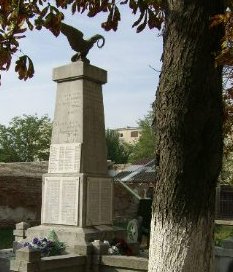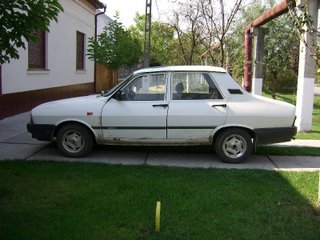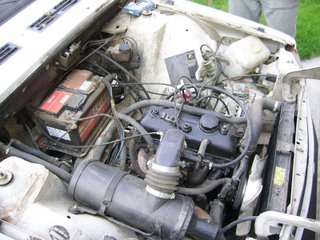very fortunate to be able to live here for 2 years. The reason
being is that it takes time to learn not only about the country,
as in the sites and customs, but also of the lives of the people
themselves.
It came to mind that despite being in a former communist
state that I only knew the plain historical facts of Romania.
The genuine incentive for this article was the thought
… what about the people? How were their lives throughout
this time. I am not an historian or a journalist by any means.
I hadn’t noticed much information concerning the lives of
ordinary people in Romania or any former Iron Curtain
country for that matter.
So, I mentioned this to a small number of elderly people. I
said that people from the USA really knew utterly nothing
of how it was here in Romania during this period. I was
extremely lucky to meet an 84 year old man named
Stefan Janczik seen below.

Mr. Stefan Janczik
With the help of my friend Marienka I was blessed with the
opportunity to meet and discuss this issue with Stefan.
When I mentioned my interest of the post WWII communist
times here in Nădlac, one and all mentioned that he would be
the best one to speak to. He has an incredible memory and
it was amazing, but he out of anyone else I have ever met,
reminds me of my father. Until my father’s last day he had
this incredible memory, even at the age of 92.
I was brought to Stefan’s house by my friend Marienka and I
was also fortunate to meet his daughter Betty and her husband
Vasile. Who live in the Capitol Bucharest but were here in
Nădlac visiting. They were an immense help as they can both
speak excellent English. I wish my Romanian was better but
in time it will be, that is my goal.
With what Stefan knows I could probably have enough material
to keep me writing in this blog for the next couple of years.
What I really was interested in was what happened here in
Nădlac after the end of WWII and how it affected their lives in
this small border town during communist rule.
Nădlac was fortunate not to be in the middle of the horrors of
war but there were many people who participated and as you
can see by the names on the monument to their war dead,
many died in battle.

WW I + II monument to war dead from Nădlac

Probably is impossible to read. There are 2 other
plaques filled with names on this monument
The Russian army really just passed through on their way West
towards Germany. At this point in time there weren’t any problems
and life was pretty much routine. Stefan mentioned that life didn’t
start to become difficult till around 1948 when the communist came
to power or began to take a more forceful approach. It really became
severe in the early 1950‘s.
Stefan was fairly well to do at the time and that made him and the
people like him targets. He himself had his house taken from him
including land and other possessions. Some of his taken land was
made public land and can’t be recouped. The communists would
just take whatever they wanted at any time without any compensation
or reason. Many people lost everything. I asked him about his house
and that I has heard that he had had a problem. He told me that they
came to his house, told him they had 48 hours to get out. The
communists took a block of 5 houses with his being one of them. I
believe it was for military use and four years later to the day that
they told him to leave, they themselves evacuated his home. The
probable reason they left was that the house was virtually destroyed
and useless at that point. They just ruined everything, there were
no doors or windows and there were holes in the walls. Stefan
returned to his home and repaired without any compensation.
Stefan was also brought to the mayor’s office and beaten. At that
time there were two prison cells in that building. He was brought at
the same time as another elderly lady. Both were beaten. I asked
him: “why?”. He answered “ I think it was because I was a little
well to do, they didn‘t explain why, they never did“. I believe that
this happened to him a total of 3 times.
I also asked him if anyone profited during this time and he said
yes there were people who did. They were the ones that
collaborated with or were part of the communists party. Stefan
said that at any time of the day one of the officials (police,
secretaries or any other type) would just come to one’s house
and if they wanted something that you had, they took it. I asked
him if there were any people still here that were collaborators
or profiteers. He said that about all of them had died and that
there were just a couple left. He didn’t name names and I didn’t
ask. I also asked if there were any incidents of revenge, and he
said that there wasn’t that he knew of. My opinion is that it is
better that way.
The communists also executed two people and when I again
asked why he told me in his opinion it was just to make a point.
His next door neighbor was one of the people executed and
it was a lady, but I forgot to ask what her age was at that
time.
Stefan mentioned a few things that were very interesting and
that it that it was much more difficult while Stalin was alive.
Also he said that he wouldn’t wish that experience on even his
worse enemies. So I am sure that there is a lot more to it.
Again I have to admit that I am not a journalist and I have to
apologize if I didn’t do this subject justice. I have to say that it
is really an experience to be able to sit with a man like Stefan
and be able to discuss this subject. As his daughter Betty
mentioned people really don’t want to think or talk about it.
That is why I consider myself fortunate and honored to have
had the chance.
Stefan is just one of the inhabitants who have had these
very bitter experiences. I can only imagine what other tales
people have that are similar or worse.
For me, before arriving in Romania the extent of my
knowledge of life behind the iron curtain in a communist country
was limited to basic history. Facts like when the communists
arrived, when they left, Ceausescu … etc. I always heard about
how if people behind the iron curtain got caught listening to the
‘Voice of America’ they could get shot. (Don’t know how true that
was). But what I thought of was … what did we ever hear of the
lives of the people themselves. Not just the big shots. So I hope
that this article is of some interest to you and will give you a little
insight to the lives of regular people during Romania‘s communist
time.




